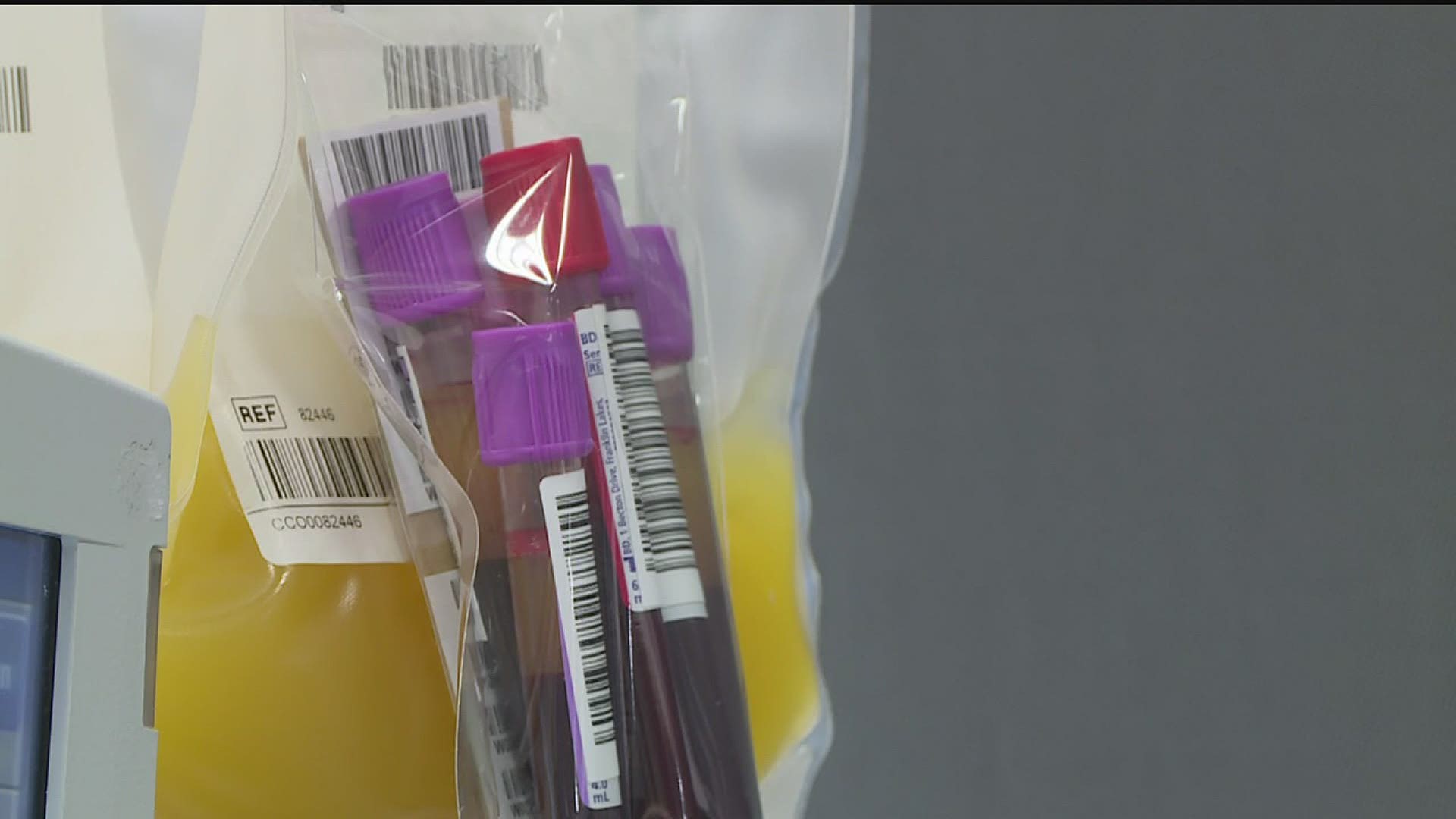MOLINE, Ill. — The Mississippi Valley Regional Blood Center opened several of its locations for special Labor Day hours. They hoped the extra donation opportunities would help boost low the lower turnout numbers they've been struggling with since the pandemic began.
"This is a tough time for the blood supply," said Kirby Winn, Public Relations Manager for the Mississippi Valley Regional Blood Center.
The blood collection centers have seen numerous cancellations and lower donor turnout since mid-March, when the pandemic took hold. This week, they're projected to have 25% less donors throughout the entire service region.
"The blood supply is used everyday," said Winn. "Hospitals never close. The treatment of patients with blood does not ever stop."
So this year, the center decided to open several locations throughout the region for special holiday hours on Labor Day. They said it's vital to keep blood on the shelves of the 115 hospitals they service, including many local ones, since the product is always in demand, even on a holiday or during a pandemic.
He says the entire situation reminds him of a large winter storm, where no donates for a few days. "Just imagine that on a much larger, longer scale. It's been challenging; it's been different."
While the blood donation centers never stopped collecting, they did have many mobile drives cancelled. That, says Winn, is where they took an especially large hit.
"Going back all the way to mid-March, it's more than 20,000 donations that we had on our books that we would have expected to collect...that we simply didn't."
Randy Augsburger has been a long-time donor at the center's Moline branch. Since he started giving blood over 40 years ago (including over 20 years in the Rockford area before the Moline location opened), he's given close to 20 gallons of blood and platelets. Now, he says he tries to come in every 56 days.
But at the end of July, Augsburger started to feel aching, flu-like symptoms. He eventually tested positive for Covid-19.
"I feel good now. Looking back at it, I had a couple of rough days," he said. "My recovery was pretty quick...it wasn't as severe as a lot of people had, but it is very serious."
After he healed, he called the donation center to see if they offered Convalescent Plasma Therapy - where the plasma of someone who previously tested positive for Coronavirus is used for antibodies in presently infected patients. The first day he was eligible after the waiting period just so happened to be Labor Day.
"I'd read about it a while back, so when it happened I immediately...since I'm a donor that was the one thing that I thought of right away to see if, once I was better, see what the guidelines were to see if I could help someone else," said Augsburger.
While he didn't realize he'd be donating on Labor Day when he set up his appointment, he said realizing it was a holiday didn't phase him. Instead, he figured he could donate in the morning and then go about his day.
"It doesn't take that much time out of your life and you might make a big difference in somebody's life."
There are several changes that have been made to make the donation process even safer. Masks are required and staff stay socially distant once the donor is all set up and pumping blood. Additionally, walk-ins are no longer allowed. Instead, donors must schedule an appointment ahead of time, either online or by phone.
First time donors will be given a pre-donation screening process to check on their recent travels and state of health. Then the actual donation - when giving whole blood rather than platelets - only takes 8-12 minutes. After a quick break with some liquids and a snack, donors are set to drive home on their own. The entire process should only take around 45 minutes, said Winn.
The center also encourages groups to set up a mobile blood drive with them, which they say will be vital heading into the last few months of the year.
"Normally we would hit Labor Day and think 'Oh, Labor Day's a tough weekend but at least we have our school season ahead," said Winn. While he noted they are still having several drives at high schools and colleges, many were cancelled after many districts moved into hybrid and online learning.
And if you weren't able to make it out for Labor Day, the center asks that you consider stopping by another day this week or next.
"We can't do this without volunteers that are willing to step forward," said Winn.
And for veteran volunteer Augsburger, he says it might be scary the first time. But it gets easier after you get comfortable with the process. He also revealed that going to the same donation center every time helps tremendously, "because you get to know the people. I would recommend doing it and then maybe scheduling something on a regular basis."
He says when Covid-19 first swept through the nation, he saw a surge in first-time donors. According to him, it didn't take long for them to find out the process wasn't as bad as they might have been expecting.
And if you schedule an appointment at the Moline location, there's a chance you might bump into him, as he plans to continue donating, just like always.
"I don't know why I do it," he said. "Someday maybe I'll need it, but right now it's just helping somebody out. And it doesn't take much time in my life to do that."

